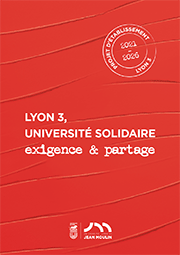AccueilRechercheProgrammes et productions scientifiquesThèsesThèses soutenuesThèses soutenues - 2006-2021Thèses soutenues - 2016
-
Partager cette page
- Recherche,
ROY Alexandre
Etude du principe d'individualisation en matière pénale
Publié le 12 décembre 2016 – Mis à jour le 20 décembre 2018
Thèse en Droit mention droit pénal et sciences criminelles, soutenue le 9 novembre 2016.
Le principe d’individualisation de la sanction pénale constitue, aujourd’hui, la pierre angulaire du droit pénal et de la procédure pénale française. Toutefois, un courant de pensée contemporain issu du mouvement américain Law and Economics a émergé progressivement en France. Celui-ci serait le seul à pouvoir apporter une réponse pertinente aux questions juridiques contemporaines, en se fondant sur le pragmatisme et l’efficacité. Cette logique a d’abord investi la procédure pénale, mais le droit de la peine n’y échappe pas. L’efficacité d’une mesure renvoie à un objectif atteint, c’est-à-dire l’absence de réitération d’infractions. Alors, comment l’individualisation de la peine peut-elle permettre d’accroître l’efficacité de la sanction pénale ? En effet, celle-ci doit permettre de rendre la peine équitable pour lui donner du sens. Ainsi, les différents législateurs n’ont eu de cesse de diversifier les mesures pouvant être prononcées par le juge, afin d’accompagner les délinquants et de les ramener à la vie collective. La doctrine considère qu’une peine est plus efficace lorsque le délinquant participe à la mesure ; il est donc possible d’en développer de nouvelles, qui permettront de responsabiliser le délinquant, en s’inspirant des mesures de justice restaurative, et en modifiant le prononcé de la peine. La césure du procès pénal permettrait ainsi de se diriger vers une peine juste, équitable et à la fois individualisée.
The principle of individualization of the punishment establishes, today, the cornerstone of the criminal law and the French criminal procedure. However, a contemporary current of thought from the American movement Law and Economics emerged gradually in France. This current would be the only one able to bring a relevant answer to the contemporary legal issues, basing itself on pragmatism and efficiency. This logic first invested the criminal procedure but the right of the punishment doesn’t escape it. The efficiency of a measure sends back to a reached objective, that is the absence of repetitive offenses. Then, how the sentencing according to the characteristics of the offender can allow to increase the efficiency of the punishment? Indeed, it shall allow the punishment to be fair and to give it meaning. For that purpose, the various legislators never stopped diversifying the measures which can be rendered by the judge to accompany offenders and bring them back in community life. This doctrine considers that a punishment is more effective when the offender takes part in the measure. It is therefore possible to develop new measures allowing to give offenders responsibilities, taking inspiration in measures of restorative justice, and to modify the render of the punishment. The césure of the penal trial would allow to head for a just punishment, fair and personalized.
Mots-Clés : Individualisation de la peine, efficacité, peine juste et utile, resocialisation, responsabilisation, examen scientifique du délinquant, césure du procès pénal.
Keywords : Individualization of the punishment, efficiency, just and useful punishment, resocialization, accountability, scientific examination of the offender, césure of the penal trial.
Directeur de thèse : Xavier PIN
Membres du jury :
- Evelyne BONIS, Professeure des universités, Université de Bordeaux,
- Muriel GIACOPELLI, Professeure des universités, Université Aix-Marseille,
- Patrick MISTRETTA, Professeur des universités, Université Jean Moulin Lyon 3,
- Xavier PIN, Professeur des universités, Université Jean Moulin Lyon 3,
- Bruno PY, Professeur des universités, Université de Lorraine.
Président du jury : Patrick MISTRETTA
Equipe d'accueil : Équipe Louis Josserand
Décision : Admis
The principle of individualization of the punishment establishes, today, the cornerstone of the criminal law and the French criminal procedure. However, a contemporary current of thought from the American movement Law and Economics emerged gradually in France. This current would be the only one able to bring a relevant answer to the contemporary legal issues, basing itself on pragmatism and efficiency. This logic first invested the criminal procedure but the right of the punishment doesn’t escape it. The efficiency of a measure sends back to a reached objective, that is the absence of repetitive offenses. Then, how the sentencing according to the characteristics of the offender can allow to increase the efficiency of the punishment? Indeed, it shall allow the punishment to be fair and to give it meaning. For that purpose, the various legislators never stopped diversifying the measures which can be rendered by the judge to accompany offenders and bring them back in community life. This doctrine considers that a punishment is more effective when the offender takes part in the measure. It is therefore possible to develop new measures allowing to give offenders responsibilities, taking inspiration in measures of restorative justice, and to modify the render of the punishment. The césure of the penal trial would allow to head for a just punishment, fair and personalized.
Mots-Clés : Individualisation de la peine, efficacité, peine juste et utile, resocialisation, responsabilisation, examen scientifique du délinquant, césure du procès pénal.
Keywords : Individualization of the punishment, efficiency, just and useful punishment, resocialization, accountability, scientific examination of the offender, césure of the penal trial.
Directeur de thèse : Xavier PIN
Membres du jury :
- Evelyne BONIS, Professeure des universités, Université de Bordeaux,
- Muriel GIACOPELLI, Professeure des universités, Université Aix-Marseille,
- Patrick MISTRETTA, Professeur des universités, Université Jean Moulin Lyon 3,
- Xavier PIN, Professeur des universités, Université Jean Moulin Lyon 3,
- Bruno PY, Professeur des universités, Université de Lorraine.
Président du jury : Patrick MISTRETTA
Equipe d'accueil : Équipe Louis Josserand
Décision : Admis
Documentation
Mise à jour : 20 décembre 2018







